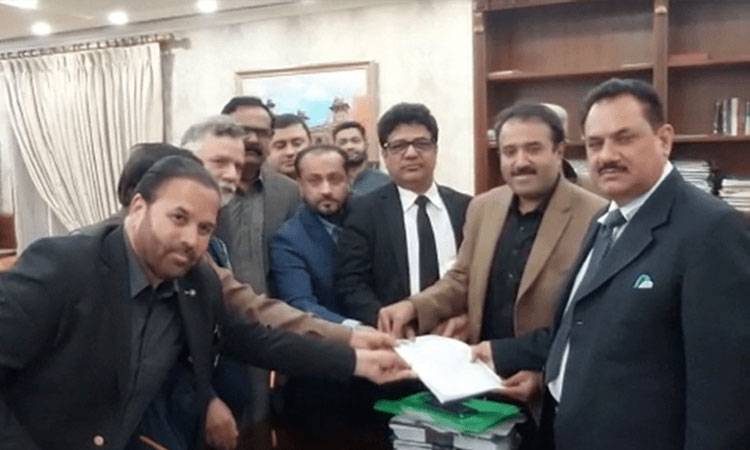 The Pakistan Muslim League-Nawaz (PML-N) and the Pakistan People’s Party (PPP) submitted a no-confidence motion against Chief Minister Parvaiz Elahi in the Punjab Assembly on Monday.
The Pakistan Muslim League-Nawaz (PML-N) and the Pakistan People’s Party (PPP) submitted a no-confidence motion against Chief Minister Parvaiz Elahi in the Punjab Assembly on Monday.
Opposition lawmakers, including PPP Parliamentary Leader Hassan Murtaza, PML-N’s Khawaja Imran Nazir, Chief Whip of PML-N Tahir Khalil Sindhu and others reached the Punjab Assembly Secretariat and submitted the no-trust motion. It was formally received by Punjab Assembly Secretary Inayat Hussain Lak.
The document submitted by the opposition stated that “members of the PPP and the PML-N of the provincial assembly have lost confidence in CM Pervaiz Elahi’s ability to lead the house as per the Constitution”. It added that Elahi had “massacred democratic traditions” and thus he had lost the confidence of the majority of members of the house.
The no-trust move was moved under “Article 136 of the Constitution read with Rule 23 of the Rules of Procedure Provincial Assembly of Punjab (PAP), 1997”.
According to Article 136, a resolution for a vote of no-confidence moved by not less than twenty per cent of the total membership of the provincial assembly may be passed against the chief minister by the provincial assembly.
A resolution referred to in clause (1) shall not be voted upon before the expiration of three days, or later than seven days, from the day on which such resolution is moved in the Provincial Assembly.
If the resolution referred to in clause (1) is passed by a majority of the total membership of the Provincial Assembly, the Chief Minister shall cease to hold office.
Separately, a no-trust motion has also been submitted against PA Speaker Sibtain Khan under Article 53 of the Constitution.
After the submission, PML-N’s Nazir told a private TV channel that the no-confidence motion was submitted against the chief minister, PA speaker, and deputy speaker.
He said there were signatures of “around 150 members” and there were more members coming from outside Lahore. “A constitutional and legal action has been undertaken after consultation from constitutional experts and we are completely confident,” Nazir added. Immediately after the resolution was submitted, Punjab Governor Baligh ur Rehman directed Elahi to seek a vote of confidence from the assembly on December 21. In an order, shared by the PML-N on Twitter, the governor said that the chief minister has “lost the confidence of his party president Chaudhry Shujaat Hussain and members of his own party belonging to the PML-Q”. “It is widely known that over the last few weeks serious differences of opinion erupted between two coalition parties of the ruling alliance in the Punjab Assembly i.e. PTI and PML-Q regarding political strategies, dissolution of the assembly, development schemes, and transfers of public officials,” it stated.
The order highlighted that the aforementioned differences became evident after the appointment of a PTI member – namely Khayal Ahmed – to the provincial assembly without the knowledge of PTI Chairman Imran Khan. It added that the most recent evidence of “cracks between the ruling alliance” was the resignation of a cabinet member after he engaged in a “verbal spat” with Elahi. “The chief minister stated in a TV programme on Dec 4 that he is not going to dissolve the provincial assembly until March 2023, a position which is completely at odds with the PTI’s public opinion on the issue.” The order also referred to CM Elahi’s criticism of Imran during an interview on Sunday for the latter’s comments on former army chief General (retired) Qamar Javed Bajwa.
Citing these facts, Governor Rehman said that Elahi “does not command the confidence” of the PA and subsequently summoned a session on Dec 21 at 4pm under Section 130(7) of the Constitution for the no-trust vote against Elahi. Section 130(7) states: “The Chief Minister shall hold office during the pleasure of the Governor, but the Governor shall not exercise his powers under this clause unless he is satisfied that the Chief Minister does not command the confidence of the majority of the members of the Provincial Assembly, in which case he shall summon the Provincial Assembly and require the Chief Minister to obtain a vote of confidence from the Assembly.”